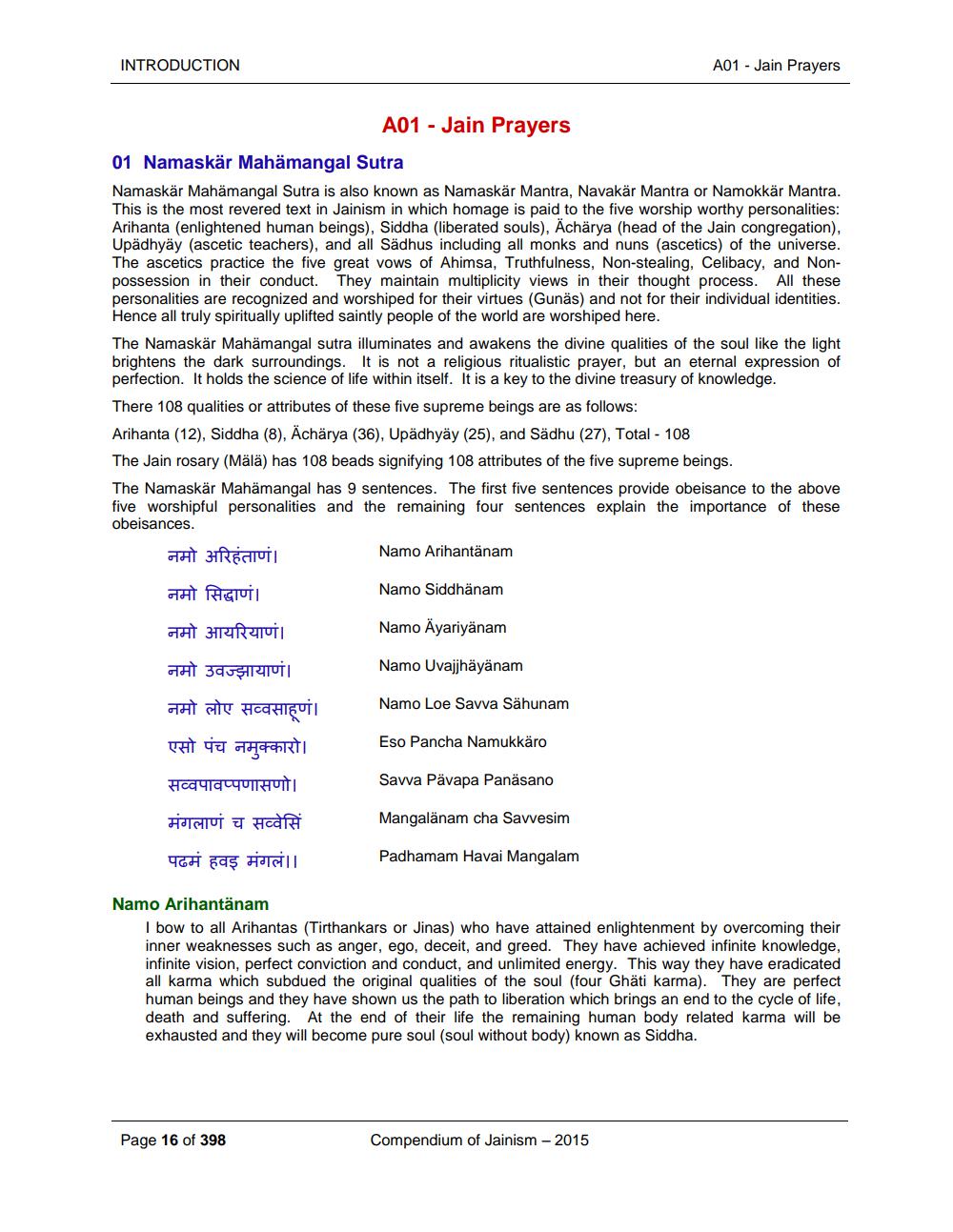________________
INTRODUCTION
A01 - Jain Prayers
A01 - Jain Prayers 01 Namaskar Mahämangal Sutra Namaskar Mahamangal Sutra is also known as Namaskar Mantra, Navakär Mantra or Namokkär Mantra. This is the most revered text in Jainism in which homage is paid to the five worship worthy personalities: Arihanta (enlightened human beings), Siddha (liberated souls), Acharya (head of the Jain congregation), Upadhyay (ascetic teachers), and all Sädhus including all monks and nuns (ascetics) of the universe. The ascetics practice the five great vows of Ahimsa, Truthfulness, Non-stealing, Celibacy, and Nonpossession in their conduct. They maintain multiplicity views in their thought process. All these personalities are recognized and worshiped for their virtues (Gunäs) and not for their individual identities. Hence all truly spiritually uplifted saintly people of the world are worshiped here. The Namaskar Mahamangal sutra illuminates and awakens the divine qualities of the soul like the light brightens the dark surroundings. It is not a religious ritualistic prayer, but an eternal expression of perfection. It holds the science of life within itself. It is a key to the divine treasury of knowledge. There 108 qualities or attributes of these five supreme beings are as follows: Arihanta (12), Siddha (8), Acharya (36), Upadhyay (25), and Sädhu (27), Total - 108 The Jain rosary (Mälä) has 108 beads signifying 108 attributes of the five supreme beings. The Namaskar Mahamangal has 9 sentences. The first five sentences provide obeisance to the above five worshipful personalities and the remaining four sentences explain the importance of these obeisances. नमो अरिहंताणं।
Namo Arihantänam
Namo Siddhanam
Namo Äyariyanam
Namo Uvajjhäyänam
नमो सिद्धाणं। नमो आयरियाणं। नमो उवज्झायाणं। नमो लोए सव्वसाहूणं। एसो पंच नमुक्कारो। सव्वपावप्पणासणो।
Namo Loe Savva Sähunam
Eso Pancha Namukkaro
Savva Pävapa Panäsano
मंगलाणं च सव्वेसिं
Mangalänam cha Savvesim
पढमं हवइ मंगलं।।
Padhamam Havai Mangalam
Namo Arihantänam
I bow to all Arihantas (Tirthankars or Jinas) who have attained enlightenment by overcoming their inner weaknesses such as anger, ego, deceit, and greed. They have achieved infinite knowledge, infinite vision, perfect conviction and conduct, and unlimited energy. This way they have eradicated all karma which subdued the original qualities of the soul (four Ghäti karma). They are perfect human beings and they have shown us the path to liberation which brings an end to the cycle of life, death and suffering. At the end of their life the remaining human body related karma will be exhausted and they will become pure soul (soul without body) known as Siddha.
Page 16 of 398
Compendium of Jainism - 2015




